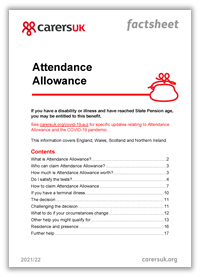Attendance Allowance
Who is entitled to Attendance Allowance?
If you have a long-term illness or disability and you’ve reached State Pension age, you may be entitled to a benefit called Attendance Allowance.
To find out more about this benefit and if you or a loved one might be eligible to receive it, read more below.
If you’re under State Pension age, you may be eligible for Personal Independence Payment (PIP).
If you’re 16 or under, you may be eligible for Disability Living Allowance (DLA).
If you live in Scotland
If you live in Scotland, you may have heard that a new benefit called Pension Age Disability Payment is replacing Attendance Allowance, and it is now widely available across Scotland. If you are currently claiming Attendance Allowance, you don't need to apply for this; you will be moved automatically. To find out more, visit our online page:
Pension Age Disability Payment.
See below for more answers to your questions on Attendance Allowance
Understanding more
Attendance Allowance is extra money if you have a long-term physical or mental condition or disability. It doesn’t matter what your condition is – what matters is how it affects you. If you’ve reached State Pension age and need help with personal care, or need support to check you’re ok, you may be eligible.
Attendance Allowance isn’t means-tested, so it doesn’t matter what your income or savings are. You can get Attendance Allowance even if you’re working or studying.
If you’re awarded Attendance Allowance, you can spend it on whatever you want that makes life easier. You don’t have to spend it on paying for care. However, your local council or trust can take Attendance Allowance into account when working out how much you need to pay for care services.
Getting Attendance Allowance won’t reduce your other benefits. In fact, it could even increase them. If you have a carer, claiming Attendance Allowance may help them qualify for benefits such as Carer’s Allowance. You and/or your carer may be entitled to other extra help too.
If you’re a carer, with a long-term condition or disability, you can claim Attendance Allowance for yourself and it won’t affect any Carer’s Allowance you may be receiving.
What are the rates?
For 2025/26, the rates are:
Higher £110.40 per week
Lower £73.90 per week
You’ll receive the higher rate if you need help or supervision during the day and at night, or if you’re terminally ill.
You’ll receive the lower rate if you need frequent help or constant supervision during the day, or supervision at night.
Find out if you're eligible
You can claim Attendance Allowance if all the following apply:
- You have a long-term physical or mental illness or disability.
- You have needed help with your personal care (for example, washing and dressing), or supervision to keep you safe, for at least six months before claiming.
- You’re over State Pension age.
There are also certain residence and presence conditions to meet.
If you’re terminally ill, there are simpler rules which make it easier to apply.
Understanding what counts
You may qualify for Attendance Allowance if you need help with personal care or supervision to keep you safe. What matters is that you need help, not whether you’re currently getting any.
Attendance Allowance is paid at a lower or higher rate, depending on the level of help you need.
What does personal care involve?
Personal care includes help with things like:
- getting in and out of a chair
- bathing and washing
- dressing and undressing
- help with medication and treatment
- getting in and out of bed and sleeping
- communicating
- eating and drinking
- using the toilet
- seeing - ie, if you need someone to see for you
- breathing
- walking.
Here are some examples of the help you may need:
- You have arthritis which makes moving difficult, so you need help getting in and out of bed, washing and dressing, and getting in and out of chairs.
- You are deaf, and need an interpreter when communicating without sign language and to interpret spoken announcements.
- You have a mental illness and need prompting to look after yourself and do things such as take your medication, eating, washing and dressing.
- You are visually impaired and need help choosing clothes to wear, using the oven safely and preparing food.
- You have a learning difficulty and need help with managing your money, writing letters and looking after your health and hygiene.
What does supervision include?
Supervision means you need someone to check on you regularly to keep you and/or others safe. For example, you may need checks if you have memory loss, are at risk of falling, have seizures, or aren’t aware of potential dangers. Being left unsupervised may mean you fall, leave the gas on, self-harm, or are violent towards others.
What are the steps to apply?
Step one: To make a claim for Attendance Allowance, you must fill out a form. You can get a form by calling the Attendance Allowance helpline on 0800 731 0122 (textphone: 0800 731 0317), or by visiting GOV.UK.
In Northern Ireland, contact the Disability and Carers Service on 0800 587 0912 (textphone: 0800 012 1574) or visit NI Direct.
If you call up for a form, it will be stamped with the date you called. If your claim is successful, it will be paid from this date (as long as you return it within six weeks). If you download a form and post it, your claim will start from the date it’s received.
Step two: When you are ready to complete the form, see our 'Tips for completing the form' in the tab below to help.
Tips to help
It’s a long form so take your time to complete it – you don’t have to do it all in one go. Ask for help from a local advice agency if needed – you can find one on the Advicelocal website.
- List all the help you need before completing the form. You could ask your carer to list all the help they give you to make sure you don’t miss anything out.
- Think about all the difficulties you have and what help would make things easier. Point out any adjustments you’ve also already made to help.
- Be honest about how long things take you and if you can do them safely.
- Remember that what matters is that you need help, not that you’re already getting help.
- If you have equipment or adaptations, explain any help you need to use them. Explain any additional help you need from another person as well as your equipment and adaptations.
- Try keeping a diary for a week if you’re not sure how much help you need, or how long things take. This can be particularly useful if your condition changes.
- You don’t have to need help every day – you’ll qualify if you need help ‘most of the time’. If your needs vary, make a list of the help you need on each day of the week or month.
- Don’t just think about what happens on good days. Get an overall picture of the help you need.
- Explain any falls or accidents you’ve had.
- Evidence is important, so send in as much as you can with your claim form. This could include a letter from your GP or consultant, your care plan, information from a community psychiatric nurse, appointment letters or prescription lists.
Keep a copy of your form and any evidence you send in. It will be useful if you need to appeal.
You won’t need to go to an assessment for Attendance Allowance unless it’s unclear how your illness or disability affects you. Most claims are decided on the information in your form.
See our benefit adviser's video tips for further guidance on how to complete the claim form.
What to expect
You’ll get a decision letter saying whether you can claim Attendance Allowance, how much it will be, and how long your claim will last for.
If someone is terminally ill, the process is different – see our guidance on disability benefits if you’re terminally ill for more information.
What if I’m turned down?
If you’re turned down, or awarded the lower rate when you think you should get the higher rate, don’t panic. It’s worth challenging the decision to have your claim looked at again.
See our page on challenging a benefits decision.
If things change...
You need to tell the Department for Work and Pensions (DWP) or Disability and Carers Service in Northern Ireland as soon as possible if your condition or circumstances change, because this could affect your entitlement to Attendance Allowance.
A change in your condition could include:
- your illness or disability getting better or worse
- the level of personal care or supervision you need changes
- going into a hospital or care home for more than 28 days
- going into a hospice (if you’re terminally ill and receive AA under special rules, your claim won’t be affected).
If you’re paid the lower rate of Attendance Allowance and the help you need increases, you can contact the DWP (Disability and Carers Service in Northern Ireland) and ask for your case to be looked at again. Be aware there is always a risk that your benefit could be decreased rather than increased, so it’s a good idea to get help from a local advice agency first. Visit the Advicelocal website to find one.
A change in circumstances could include:
- going abroad for more than 13 weeks
- changing your name, address or bank details
- going into prison.
These are just a few examples of changes that could affect your Attendance Allowance. If you’re not sure if a change affects your Attendance Allowance, report it to the DWP or Disability and Carers Service anyway.
Useful to know
Receiving Attendance Allowance could lead to an increase in any means-tested benefits or tax credits you receive, or you might now find that you qualify for them for the first time. Contact the offices that pay these benefits to find out more.
You can find out what benefits you’re entitled to and how much you should be getting by doing an online benefits check, or contacting one of our advisers to arrange one at advice@carersuk.org
You can also look into carrying out an online benefits check by visiting either:
Blue Badge scheme
The Blue Badge scheme helps you park closer to your destination if you have difficulty walking. For example, a Blue Badge lets you park free at parking meters and in pay and display areas.
Getting Attendance Allowance might support your application for a Blue Badge. Contact your local council or trust for further information.
Money off train travel
You can buy a Disabled Person’s Railcard to cut train fares for you and a friend. Call 0345 605 0525 or visit the Disabled Persons Railcard website. This isn’t available in Northern Ireland.
Help with the cost of public transport
If you live in England, Wales or Northern Ireland and are disabled, you may qualify for free local bus travel. This isn’t directly linked to whether you receive Attendance Allowance. Contact your local council or trust to find out more.
In Scotland, if you receive Attendance Allowance you’ll be entitled to free bus travel. Contact Transport Scotland on 0141 272 7100. You will also be entitled to a Companion Card, allowing someone to travel with you for free.
In Northern Ireland, you’ll be entitled to a Senior Citizen SmartPass if you’re 65 or over. Contact Translink on 0845 600 0049 for more information.
Further guidance
Our Attendance Allowance factsheet provides more information and, at the end, it contains a listing of organisations that offer further specialist help and support.


